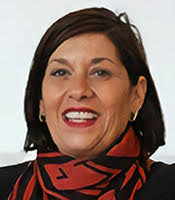
Lorena Aguilar, the new executive director of Binghamton University’s Kaschak Institute for Social Justice for Women and Girls, already has plans set in motion to turn the institute into a beacon of advocacy and change.
In over 50 countries, Aguilar has served as a global leader, using her platform to spread ideas — some of which include social justice, economic imbalances, human rights, sustainability, climate change and public health. She has been appointed Costa Rica’s Vice-Minister of Foreign Affairs on the United Nations’ Climate Advisory Panel, but has also worked as a board member for several other organizations, including Momentum for Change under the United Nations Climate Change Convention (UNFCCC) and Women Organizing for Change in Agriculture and Natural Resource Management (WOCAN).
According to Aguilar, after experiencing undesired fame from her success, she decided to participate in work that felt more hands-on and impactful.
“I decided my work was on the ground, in the field,” Aguilar said. “I am a technician devoted to woman empowerment. The red carpet was not precisely what I wanted. [COVID-19] was good because it made me realize I wanted to pass the baton to new generations. With the time I had left, I wanted to make a difference.”
The institute was originally established in 2018 with the support of Ellyn Uram Kaschak, a pioneer developer of the feminist therapy. The institute’s main purpose is to continue Kaschak’s fight for justice by supporting student research, scholarships and teaching.
Having been a part of the feminist movement herself, Aguilar said she plans to give fellows of the program a proper foundation where they can spread their research and ideas.
“Nationally, a lot of the things we thought were given rights have been stripped from us, and being one of the ones who had to go out and fight for their rights in the 60s, I never thought I’d see us moving backward,” Aguilar said. “I hope the institute will be the place that allows me to transfer my knowledge on how to fight to younger girls. It can be very painful to fight for your rights, and sometimes you’ll feel discouraged or like there’s no way out. Only when you come together and cure yourself from the wounds of the process can you find relief and hope, and I want the institute to be a place where that curing can happen.”
Besides social advocacy, Aguilar has a strong interest in climate change and how the environment can affect health. Aguilar explained that one of her research initiatives for BU and the institute is to explore the connection between poverty, environmental degradation, premature death and health concerns.
“I have found that the right to a clean and safe environment is a human right,” Aguilar said. “It’s about social justice. When you look at people who are most affected by not only environmental change, but environmental degradation around the world, these are the poorest of the poor, the ones who don’t have voices. Marginalization is the cause of their vulnerabilities. For the U.S. and Europe it’s different but for my countries in the global south, these topics are a matter of life or death. There is a very close relationship between social justice and the right to a clean and safe environment.”
Her first steps toward the institute’s future begin with the fellows of the program. Aguilar expressed a desire for student voices to be valued and to reach her and her executive committee, and plans to achieve this by opening new student-only positions on the board.
“How can we say we’re going to work for you and with you if you don’t have a voice in this process?” Aguilar said. “That is the first thing I want to change about the institute — it’s about participation and hearing everybody. Then, we’re putting out a set of programs, one of which is to go to Guatemala to develop a climate change and gender action plan. I want the students to have the possibility to go to the ground and hear the voices of the women, to translate policies and then follow them. I also want to provide students with internships with possibilities of speaking to world leaders.”
Madison Mandarino, a junior majoring in psychology, said she is looking forward to the new initiative, so that she can contribute research she has been doing with her lab.
“I’m ecstatic that the institute is finally going to gain a presence on this campus,” Mandarino wrote in an email. “I’ve been doing sustainability research and [am] trying to connect it to poverty in developing countries, so [Aguiilar’s] plans are right up my alley. I definitely will be putting in an application for a spot on the E-Board.”


